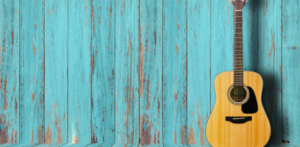People often buy vintage guitars to own a piece of history and tap into its “mojo”, the belief that certain objects take on magical properties simply because they are old.
Others seek an instrument they can play and record with. Whatever your reason for seeking out vintage guitars, there are a few key points you should keep in mind before making your purchase.
What is a Vintage Guitar?
Typically speaking, guitars produced during or before the 1970s are considered vintage; however, some guitarists consider some instruments produced later to be vintage as well; this could be due to a variety of factors, such as their quality or rarity/difficulty in finding.
History should also be considered as another factor for defining whether an instrument is vintage. If an instrument was played by an established musician during its prime years and associated with them – for instance performing on a major stage or writing a hit song – then that can give an instrument an instant vintage status.
Studio1 vintage guitar may also become vintage if its repairs or modifications have negatively affected its value as a collectable. While tinkering may be common among guitarists, replacing non-original components with replacement ones could diminish its worth as a collectable.
What Makes a Guitar Vintage?
 There is no exact age at which a guitar becomes vintage; any instrument 30 years or older generally falls into this category. It applies both to acoustic and electric guitars as well as bass guitars. Certain characteristics make certain guitars more desirable to collectors or buyers.
There is no exact age at which a guitar becomes vintage; any instrument 30 years or older generally falls into this category. It applies both to acoustic and electric guitars as well as bass guitars. Certain characteristics make certain guitars more desirable to collectors or buyers.
One major consideration when purchasing an acoustic guitar is its construction material – particularly wood for acoustic instruments – as this can change over time, altering both tone and feel of the instrument. Furthermore, some areas of wood may break down over time; for instance, headstocks often endure great stress from tension on strings that causes cracks that dramatically reduce value.
History is also an integral factor when considering the value of a guitar, including how and who used it. For instance, having been owned by a famous musician such as a rockstar or jazz musician could increase its value significantly.
Condition is another key element when it comes to Studio1 vintage guitar values. For instance, if it was in a band and regularly bashed around by its audience, the instrument may become damaged and even have cracks; if maintained in great shape by its previous owners, it likely retains value.
How Do I Know If I Have a Vintage Guitar?
Owning a vintage guitar is more than just about owning the instrument itself; it is about engaging with its culture and fandom and having something with “mojo”, the idea that some objects become more valuable simply through age and association with iconic artists.
Ascertaining whether a guitar has its “mojo” can be subjective, but for serious collectors, the condition is one of the primary determinants of its value. Two similar guitars of similar make and model could vary greatly in price based on how good or bad their current state may be.
How Do I Buy a Vintage Guitar?
Vintage guitars can be great investments and enjoyable instruments to play, yet their value varies based on several factors–not only age but also condition and tone. Before investing your money in one, inspect it carefully and give yourself enough time to test how well it suits your musical preferences.
As with any purchase, it is wise to buy from a reputable seller to ensure the guitar you choose is in excellent condition and has been properly set up – this can be particularly important with older instruments that may have seen extensive use over the years. Inspect the frets for signs of wear to ensure it has seen regular play rather than sitting idly inside their case.
Considerations must also be given when buying a Studio1 vintage guitar: customizing it may be costly and cause its value to decrease over time, so purchasing an instrument in its current state, with only minor adjustments as necessary.
Many players put less emphasis on finding an original instrument; rather, they prioritize finding one that sounds and plays well while possessing character. Luckily, vintage guitars offer many possibilities that meet both requirements and preferences.
